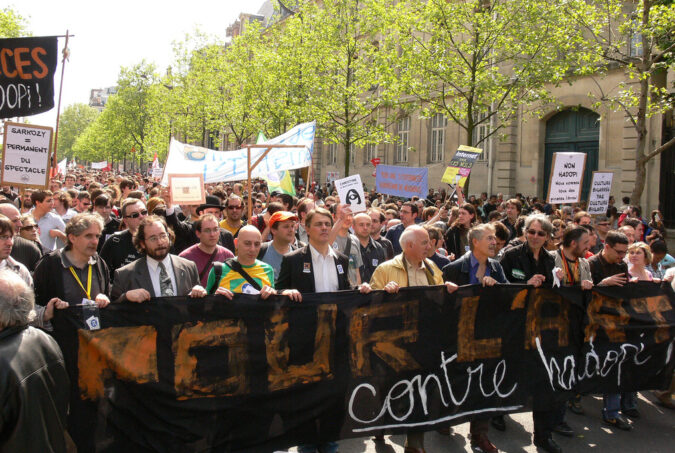
Anti-HADOPI march in Paris, 2009. Image bykurto.
In the past few years, many governments have attempted to curb online “piracy” by enforcing harsher copyright control upon Internet users. This trend is now well documented in the academic literature, as with Jon Bright and José Agustina’s or Sebastian Haunss’ recent reviews of such developments. However, as the digital copyright control bills of the 21st century reached parliamentary floors, several of them failed to pass. Many of these legislative failures, such as the postponement of the SOPA and PIPA bills in the United States, succeeded in mobilising large audiences and received widespread media coverage. Writing about these bills and the related events that led to the demise of the similarly-intentioned Anti-Counterfeiting Treaty Agreement (ACTA), Susan Sell, a seasoned analyst of intellectual property enforcement, points to the transnational coalition of Internet users at the heart of these outcomes. As she puts it: In key respects, this is a David and Goliath story in which relatively weak activists were able to achieve surprising success against the strong. That analogy also appears in our recently published article in Policy & Internet, which focuses on the groups that fought several digital copyright control bills as they went through the European and French parliaments in 2007-2009—most notably the EU “Telecoms Package” and the French “HADOPI” laws. Like Susan Sell, our analysis shows “David” civil society groups formed by socially and technically skilled activists disrupting the work of “Goliath” coalitions of powerful actors that had previously been successful at converting the interests of the so-called “creative industries” into copyright law. To explain this process, we stress the importance of digital environments for providing contenders of copyright reform with a robust discursive opportunity structure—a space in which activist groups could defend and diffuse alternative understandings and practices of copyright control and telecommunication reform. These counter-frames and practices refer to the Internet as a public good, and make openness, sharing and creativity central features of the new…

